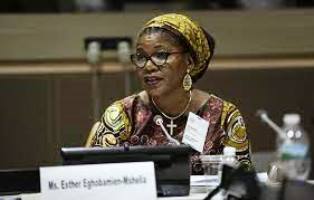Women Affairs Minister Pauline Tallen has solicited the support of UN Member States to elect Mrs Esther Eghobamien-Mshelia into the UN Committee on Convention of the Elimination of All Forms of Discrimination against Women (CEDAW).
CEDAW is the body of independent experts that monitors implementation of the Convention on the Elimination of All Forms of Discrimination against Women.
The CEDAW Committee consists of 23 experts on women’s rights from around the world.
Tallen made the call at a hybrid roundtable event on” Expanding Gender Responsive Investment Initiatives for Economic Recovery and Sustainability,’’ hosted by the Permanent Mission of Nigeria to the UN at Nigeria House in New York.
Tallen spoke virtually from Kigali at the event, aimed at stimulating discussions and initiate actions on gender empowerment ahead of the CEDAW election on Thursday.
“That is why Nigeria is presenting a candidate with the requisite expertise for the CEDAW to advance the noble vision of women’s economic empowerment for rights protection, especially in the aftermath of the COVID 19 pandemic,’’ the minister said.
Tallen said it was worrisome that around 2.4 billion women of working age today were not afforded equal economic opportunity.
She said working women were not afforded equal economic opportunity and 178 countries maintained legal barriers that prevent women’s full economic participation, according to the World Bank’s Women, Business and the Law 2022 report.
“We, therefore, need the full engagement of the Private Sector to turn the tide around for women across the world.
“Relatedly, Public Procurement and Private Sector Investments have an unprecedented opportunity to demonstrate their commitment to bridging historical gender gaps, reducing the feminisation of poverty and making women central to economic revival.
“The COVID-19 pandemic impacts and the global economic shocks have differential gender impacts that have triggered a spiraling increase in Gender-based violence.
“It is imperative that women are empowered to fully participate in value and supply chains in all sectors of the global economy, and suffice it to say, that the best time to invest is now,’’ the minister said.
Tallen said the continued exclusion of women significantly had restricted and impeded post pandemic recovery efforts, especially in developing countries.
In addition, she said reports on Gender Based Violence (GBV) cases were increasingly becoming akin to cruelty and atrocious in nature.
“Exploring the gender dimensions to these concerns will be a priority focus for the new UN Committee on Prevention of Genocide and Atrocities, which I have the privilege and honor of heading and I hope your deliberations will open up new vistas of partnership.
“Exploring new investment frontiers in women’s enterprises via Gender Responsive Investments (GRI) is an acknowledge key to unlocking their yet untapped economic assets.
“The African Continental Free Trade Area provides a unique opportunity to stimulate new inclusive engagements within Africa and globally.’’
In addition, the minister said the projected 75 million dollars annual retail market needed to be carefully and maximally explored with a variety of partners who are keen on enhancing participation of women entrepreneurs are greatly needed.
Tallen said help would be needed to eliminate barriers women face in accessing funds, business opportunities, and markets especially in key sectors like energy, infrastructure, digital technologies, agriculture as well as trade.
“There is no doubt that investing in women will accelerate the attainment of the Sustainable Development Goals (SDGs) and increase global Gross Domestic Product,” she said.
Also speaking, Mr Umar Ahmed, Deputy Director, Commodities and Export Department, Federal Minister of Industry, Trade and Investment said the Nigeria Government had been providing enabling environment for women to market their commodities through various initiatives.
Ahmed, in his presentation on “Commerce 160” said the initiative was developed to promote and export 40 agricultural commodities, 40 manufactured products and 40 solid mineral products.
“The idea is to focus on 40 countries/regions of the world and take advantage of the concessions offered by the subsisting bilateral, multilateral trade agreements and Memorandum of Understandings (Mou) that will facilities the smooth export into their markets,” he said.


